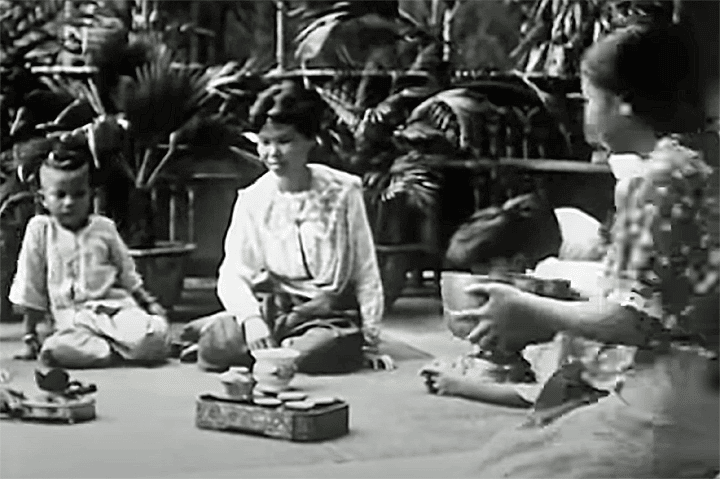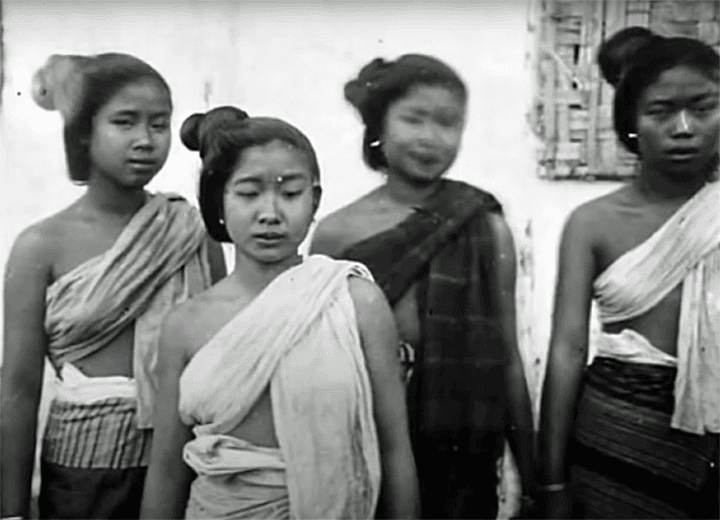Stories from Ancient Siam (Part 3, Closing)

How did foreigners view Siam in the past? Andrew Freeman (1932): 'This people is incapable of governing itself. Watch how they do things. The Oriental will never appreciate what the white man did for him.' Sixteen stories in a row, translated by Tino Kuis.
These short stories come from a booklet entitled 'Tales of Old Bangkok, Rich Stories From the Land of the White Elephant'. They are listed there in random order as to time, place, and subject. I just left it that way. The source of each story is mentioned, but I have only mentioned the person and the year.
George B. Bacon, 1892
Siamese children are the most fascinating little things I know. They captivated me from the start, but it saddens me that one day they will become as ugly as their fathers and mothers, and that's saying something!
Ernest Young, 1898
The only real native neighborhood is the long narrow bazaar known as Samphaeng. It is about 2 kilometers long and contains a very mixed population of Indians, Siamese and Chinese.
The long narrow bazaar has its own attractions. All native products come together here, and a number of people practice their native craft here. Blacksmiths and weavers are busy with their trade, gold and silversmiths make boxes and decorations for the wealthy and gem workers grind stones to be set in jewellery.
Peep shows and open-air performances let the idlers linger and busy bees throng the uneven, rough-paved sidewalks. Late at night the shops are closed but the gambling dens, opium dens and brothels are filled with the lowest of the low class.
Sunthorn Phu in 'Nirat Retch'
(Poet, 1786-1855)
In Bang Luang on the small canal, many Chinese sell their pigs. Their wives are so young, white, beautiful and rich. Thai men like me, who would ask for their hand, are shut out like iron bars. But if you have money, like these Chinese, those bars just melt away.
Ernest Young, 1898
The lack of surnames and house numbers causes many problems when sending letters. An envelope should often be addressed like this:
To Mr. Lek
Student at Normal School
Son of Mr. Yai, soldier
At the foot of the Black Bridge
Behind the Lotus Temple
New Road, Bangkok
Charles Bulls, 1901
The Chinese shout a lot and work hard. The Siamese are calmer and pass in silence.
From the diary of Gustave Rolin-Jaequemyns, 1893
(Belgian advisor to King Chulalongkorn. Two French warships had steamed up the Chao Phraya to pressurize French demands over territories on the Mekhong, now Laos.)
Everyone seemed demoralized. The king asked me what I thought would happen, and the Richelieu (Danish commander of the Siamese navy) suggested using two Siamese ships to sink the French ships.
I asked if there were any chances of such an operation being successful. He couldn't get an affirmative answer from his lips. That is why I strongly advised against this operation, which I would not even support if success were guaranteed.
If successful it would mean war and if unsuccessful it would cause a bombing of Bangkok and the palace. My answer was that, in the interests of the city, we should refrain from hostilities.
Emile Jittrand, 1905
The French mix more with the natives than the British; they are not as distant as the latter. By alternately being confidential and angry, they make themselves disrespected by the natives.
James Anderson, 1620
(Arts, from British East India Company documents.)
Gambling was not the only weakness in those days as the Company's correspondence clearly shows. There are references to lasciviousness, untold illnesses, drunkenness and bastards in letters from the Company's servants.
Perhaps morale was of a lower standard than it is now. We must, however, judge these Englishmen with leniency, given their exile and their environment so different from their English at home, and they have been exposed to many new temptations.

Andrew Freeman, 1932
"When this road was built, the trains didn't run at night because of the many collisions with elephants."
"You're kidding," I said.
The Englishman poured again.
"Not really," he continued, "there should be a law requiring elephants to wear headlights and taillights."
'My God, if we controlled Siam we would teach them about efficiency. This people is incapable of governing itself.'
'Why not?' I asked.
'Well, look around you. Watch how they do things. The Easterner will never appreciate what the white man did for him, that's why. If we acted like the Siamese, what would become of us?'
From the Memoirs of Prince William of Sweden, 1915
(After attending King Rama VI's coronation.)
The next day, the last of the year, we returned to Bangkok tired but safe, with only fond memories of an interesting hunting trip. The horns of a buffalo from Ban Chee-wan are now among the proudest specimens of my hunting trophies, for as far as I know Leewenhaupt and I are the only ones who have ever shot this species of the Siamese fauna. And in the future it will become even more difficult, if not impossible, because a hunting ban is coming for these beasts that are almost extinct.
Government radio broadcast, November 7, 1939
“In accordance with the Fifth Edict, the government asks all Thais to eat noodles because noodles are good food, they contain rice and nuts, all with sour, salty and sweet taste and all produced in Thailand. Noodles are nutritious, clean, cheap, easy to buy and they taste great.'
Time, Nov. 24, 1947
Phibun Sonkran (general who seized power in 1946) forbade the Siamese to go out in the street without hats or shoes, to chew betel, to sit or squat on the street, or to wear the panung. In official photos, shoes and hats were colored over images of farmers.
Phibun also ordered office holders to kiss their wives before going to office. Violators of these decrees were sent to 'education camps'.'
(Panung: traditional clothing for men and women: a cloth wrapped around the hips and then tied at the back between the legs.)
TIME magazine, 1950
Ananda (Rama VIII, 1925-1946) was a strange young king. Full of Western ideas, he refused to talk to visitors who sat down at the bottom of his chair before him, the Siamese way. He demanded that they sit on chairs, level with him.

Neue Zurcher Zeitung, April 15, 1950
On the morning of June 9, 1946, news spread in the city that the young king had been found dead in his bedroom with a bullet wound to the head. Was it an accident? Suicide? Or a murder?
There were arguments for each of these three possibilities. There were those who insisted that Ananda Mahidol dreaded the great responsibilities and difficult tasks that awaited him. In the end, suspicion fell on a group of ambitious politicians whose supposed intention was to abolish the monarchy.
Associated Press, 1952
King Bhumiphol Adulyadej today signed the new Thai constitution promulgated by the military junta that overthrew the government four months ago in a bloodless coup d'état.
The king was present at the elaborate ceremonies which started at exactly 11 o'clock, a time considered very auspicious by the astrologers.
Yesterday, Radio Bangkok announced that the ceremony had been postponed, but the military junta convinced the king to change his mind. Marshal Sarit revealed that at 11 pm on Monday, General Thanom Kittichachorn, second-in-command of the army, had met the king. Asked what the king thought of the coup, Sarit replied: 'What should the king say, everything was already over.'
Alfred McCoy, 1971
The 'opium war' between Phao (chief of police) and Sarit (general and prime minister) was a hidden war where all battles were shrouded in official secrecy. The funniest exception occurred in 1950 when one of Sarit's army convoys approached the station in Lampang with a shipment of opium.
The Phao police surrounded the convoy and demanded that the army hand over the opium because fighting drugs was the sole responsibility of the police. When the army refused and threatened to fire their way into the station, the police dragged in machine guns and dug in for a firefight.
The nervous stand-off lasted for two days until Phao and Sarit themselves showed up in Lampang, took possession of the opium, escorted it together to Bangkok where it quietly disappeared.
Source:
Chris Burslem Tales of Old Bangkok, Rich Stories From the Land of the White Elephant, Earnshaw Books, Hong Kong, 2012.
Stories from Ancient Siam (Part 1) was featured on Thailandblog on Sept. 24; Stories from Ancient Siam (Part 2) on September 28.
Photos: Tableaus at the Thai Human Imagery Museum, 43/2 Mu.1, Pinklao Nakhon Chasi Road, Nakhon Pathom. Tel. +66 34 322 061/109/607. Opening photo: Eight kings of the Chakri dynasty; Rama IX, the current monarch, is not listed. The photo of the woman in panung was not taken in the museum.


Fascinating to read. Especially that letter from 1620. So there were Thai women who came to complain to the Company because they had an illegitimate child by an Englishman. Very emancipated!
I have to disappoint you, Paul, I've thought about it but just don't know. It is interesting to read how foreigners viewed Thailand in the past, but what is the truth value? How colored are their stories? And how do you assess the mentality of today's Thailand? I think that's why you have to be careful to draw lines from the past to the present. I didn't learn much from it as far as the present is concerned.
I actually get the most pleasure from what you can see as exceptional, not fitting an assessment of the Thai mentality at the time. King Ananda who insisted that visitors should not sit on the floor but on a chair as high as himself. Perhaps the lesson I am learning is that the reality is very diverse.
Another very interesting story, and I especially enjoyed looking at the collection of photos that were placed underneath it. I look forward to the next book review!